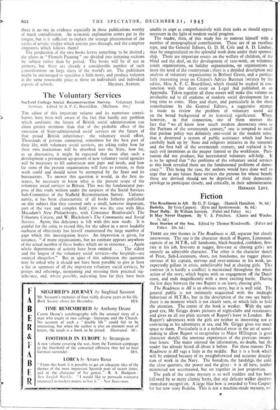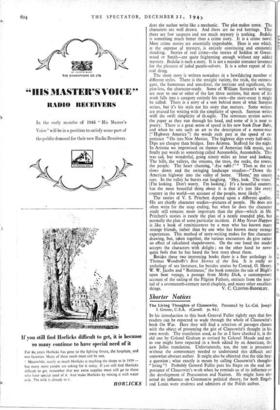Fiction
THERE are two themes in The Readiness is All, separate but closely interwoven. The one is the character sketch of Rupert, Lieutenant, captain of an M.T.B., tall handsome, black-bearded, confident, first- rate at his job, first-rate at rugger, first-rate at chasing girls: not entirely an admirable character. The other is the character sketch of Peter, Sub-Lieutenant, short, not handsome, no rugger player, envious of his captain, nervous and over-anxious in his work, un- expectedly gallant in crisis, unbelievably bad at chasing girls. This contrast (it is hardly a conflict) is maintained throughout the whole action of the story, which begins with an engagement off the Dutch coast, and ends magnificently with a most exciting battle. During the few days between the two Rupert is on leave, chasing girls.
The Readiness is All is an obvious story, but it is well told. The general public is not intimately acquainted with the midnight behaviour of M.T.B.s, but in the description of the two sea battles there is no moment which is not clearly seen, or which fails to hold the attention. The centre of the book is weaker. With the same good eye, Mr. Griggs draws pictures of night-clubs and restaurants, and gives an all too plain account of Rupert's leave in London. But Rupert's adventures with the girls are neither as interesting nor as convincing as his adventures at sea, and Mr. Griggs gives too much space to them. Particularly is it a technical error in the art of novel- making to allow Rupert to recapitulate to Major Hillington (a good character sketch) the amorous experiences of the previous twenty- four hours. The major enjoyed the information, no doubt, but the reader has already heard all about it before. For these reasons The Readiness is All sags a little in the middle. But it is a book which will be enjoyed because of its straightforward and accurate descrip- tion of work in the Navy. The boredom, the hardship, the cold, the close quarters,. the power and the glory: it is all here, neither minimised nor accentuated, but set together in just proportion.
The path of the crime mystery is so well trodden and has been followed by so many clumsy boots, that any delicate walker deserves immediate recognition. A large blue bow is awarded to Vera Caspary for her new story Bedelia. This is not a machine-made mystery, nor
•
does the author write like a mechanic. The plot makes sense. The characters are well drawn. And there are no red herrings. That there are few suspects and not much mystery is nothing. Bedelia is something much better than a crime story. It is a crime novel. Most crime stories are essentially improbable. Here is one which, at the expense a mystery, is entirely convincing and eminently shocking. Stories of real crime—the stories of Seddon or Green- wood or Smith—are quite frightening enough without any added mystery. Bedelia is such a story. It is not a murder romance-invented for the pleasure of jaded puzzle-solvers. It is a sober report of the real thing. The short story is written nowadays in a bewildering number of different styles. There is the straight variety, the trick, the extrava- gant, the humorous and anecdotal, the intricate and significant, the plot-less, the character-study. Some of William Saniyan's writings are near to one or other of the last three sections, but most of his work falls into a category entirely his own—the story-essay it might be called. There is a story of a sort behind most of what Saroyan writes, but it's his style not his story that matters. Some writers are praised for writing with the simplicity of speech. Saroyan writes with the swift simplicity, of thought. The sentences stream across the paper as they run through his head, and .some of it is near to poetry. There is a great sense of speed in his new book Dear Baby, and when he sets such an art to the description of a motor-tour (" Highway America ") the words rush past at the speed of ex- perience " On into New Mexico. The highway dips every half-mile. Dips are cheaper than bridges. Into Arizona. Stafford for the night. In Arizona we improvised on themes of Armenian folk music, and finally put words to something called Automobile, Automobile. This was sad, but wonderful, going ninety miles an hour and looking. The hills, the valleys, the streams, the trees, the rocks, the towns, the people. The heart chanting, ' Aye rakh ! ' " Then as the car slows down and the swinging landscape steadies—" Down the American highway into the valley of home. ' Home,' my cousin says. In the valley he bursts out laughing. ' Hey, look. The vines.' (I'm looking. Don't worry. I'm looking.) It's a beautiful country, but the most beautiful, thing about it is that it's just like every country in the world—on account of the people, most likely." . '
The stories of V. S. Pritchett depend upon a different quality. His are chiefly character studies—pictures of people. He does not often write for 'the snap ending, but when he does the character study still remains more important than the plan—which in Mr. Pritchett's stories is rarely the plan of a neatly rounded plot, but normally the plan of some particular incident. It May Never Happen is. like a book of reminiscences, by a man who has known many strange friendi rather than by one who has known many strange experiences. This method of story-writing makes for fine character drawing, but, taken together, the various encounters do give rather an effect of caleulated shapelessness. On the one hand the reader accepts the characters with delight ; on the other hand he never quite feels that he has heard the best story about them.
Besides these two interesting books there is a fine anthology in Thomas Woodroffe's Best Stories of the Sea. It is really an anthology of sea literature, for besides stories by Conrad, 0. Henry, W. W. Jacobs and " Bartimeus," the book contains the tale of Bligh's open boat voyage, a passage from Moby Dick, a contemporary account of the sailing of the Pilgrim Fathers, extracts from the jour- nal of a seventeenth-century naval chaplain, and many other excellent































 Previous page
Previous page